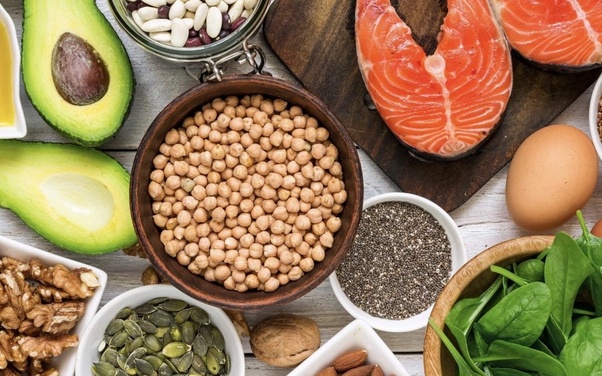
Best Foods for Hormone Balance: Supports Women’s Health
Today we’re talking about something close to our hearts (and bodies): our hormones. As women, our hormones act as our bodies’ leaders, influencing everything from mood swings to the regularity of our menstrual cycles. Guess what? The powerhouse of our hormonal symphony is our food! Today we will look at the best foods to consume to balance hormones.
I’ll also tell you about the worst foods for hormone health, so you’ll know to avoid them!
Understanding Hormones
Let’s take some time to understand hormones. Think of them like the backstage staff of a concert; They are often invisible but control the show.
Hormones are biochemical messengers that our body uses to keep everything functioning properly.
Here are some notable players:
Insulin – This hormone is like the body’s ambulance. It is produced in the pancreas and controls how your body uses or stores sugar and fat.
This is important to preserve your energy; So when you eat, insulin is released to help move sugar from food to your cells for later use. But too much sugar can make you a little sick and cause problems like insulin resistance.
Estrogen and Progesterone – They are the protagonists of the story of female hormones. They are mainly responsible for regulating your body’s menstrual cycle and fertility.
Estrogen plays an important role in the first half of your cycle, forming the lining of the uterus and preparing the egg for fertilisation.
Progesterone works to prepare your body for pregnancy in the second phase of the cycle.
Cortisol – Think of it as your body’s alarm clock. When you’re stressed, cortisol is released to prepare your body for a “fight or flight” situation. It increases your heart rate, raises your blood sugar, and inhibits the body’s non-urgent functions such as digestion and reproduction.
Although cortisol is important in coping with stress problems, persistently high levels can lead to problems such as weight gain, anxiety and menstrual irregularities.
Thyroid hormones (T3 and T4) – These hormones are like your body’s temperature. They control your body’s metabolism—how fast you burn calories and how fast your heart beats.
Thyroid hormone imbalance can cause changes in the body, fatigue, or extreme heat or cold.
It is important to understand these hormones because when they are in balance, they create harmony in our bodies. But when one or more hormones are disrupted, the entire body is disrupted.
This is where our food comes in! The food we eat affects the production, function, and elimination of hormones; Therefore, healthy nutrition is very important.
The Impact of Diet on Hormones
The food we eat does not only fill us up but also interacts with our hormones, influencing their functions, and production.
Impact of sugar and refined carbohydrates – These foods cause insulin levels to rise and then fall. This bumpy ride can lead to energy crashes, mood swings, and over time, even insulin resistance.
This is when cells do not respond well to insulin, which can lead to more serious health problems such as type 2 diabetes.
Effect of fatty food – The type of fat is very important when it comes to hormones. Trans fat and excess saturated fat can cause inflammation, which disrupts hormonal signals.
On the other hand, healthy fats found in foods such as avocados, nuts and seeds are important for the production of hormones, especially female hormones such as estrogen and progesterone.
Protein and Hormones – Dietary protein provides essential amino acids that our body cannot produce on its own.
These amino acids are the building blocks of everything in the body, including hormones. Not getting enough protein can affect hormone production.
Effects of fibre – Foods rich in fibre help the body absorb sugar into the blood and regulate insulin.
Additionally, certain types of fibre may help remove excess estrogen from the body and support the health of sex hormones.
Effects of Alcohol and Caffeine – Two powerful drugs for the endocrine system. For example, too much caffeine can increase cortisol levels, making you anxious and stressed.
Alcohol, on the other hand, affects the liver’s ability to metabolise hormones, which can affect hormonal balance.
When we choose foods that support our hormones it can help regulate everything. This means focusing on a combination of simple carbohydrates, healthy fats, lean protein, and lots of fruits and vegetables.
But remember, it’s all about balance; Sometimes tolerances are a part of life, just try not to make them the norm.

Good Foods for Hormonal Balance
Complex Carbs – This is how you can embrace variety. Complex carbohydrates like whole grains (quinoa, brown rice, oats), legumes (chickpeas, lentils, black beans), and starchy vegetables (like sweet potatoes, squash, and squash) are good options.
Why? They digest slowly and provide stable energy, helping maintain stable insulin levels and preventing energy crashes.
They also often contain fibre, which we know is good for hormonal health!
Healthy fats – Avocados, nuts, seeds, and fatty fish like salmon and mackerel are not only delicious but also good for your hormones.
This food is rich in essential fatty acids such as omega-3 and omega-6, which are important components of cell membranes and necessary for hormone production.
For example, omega-3 fats can help maintain healthy progesterone and estrogen levels and support reproductive health.
Protein-Rich Foods – Protein is essential for hormone production. Lean meats like chicken and turkey, fish, eggs, tofu, and Greek yogurt are all good choices.
They provide amino acids necessary for hormone production. Additionally, protein helps regulate ghrelin (the hunger hormone), making you feel full after a meal.
Foods rich in fibre – Fibre is a hormone helper for many reasons. First, it helps control insulin by slowing the absorption of sugar into the blood.
Secondly, it aids digestion and supports the balance of sex hormones by helping to remove excess estrogen from the body. Foods such as fruits, vegetables, legumes and whole grains are rich in fibre.
Foods Rich in Antioxidants – Here’s your inflammation fighters! Foods like blackberries, dark chocolate, artichokes, and even green tea are rich in antioxidants that help fight inflammation in the body.
Since inflammation can disrupt hormonal balance and lead to many health problems, including insulin resistance and cancer, include these foods in your diet. Rice may help support overall hormonal health.
Including these foods in your daily diet can be beneficial for your hormonal health. Of course, everyone is unique, so listen to your body and adjust your diet accordingly.

Foods to Avoid for Hormonal Balance
Sugary Foods – Do you know these sweet or comforting drinks can do more harm than good to your hormones?
These sugary foods cause blood sugar to rise, which causes insulin to rise. At the same time, this cycle of high and low blood sugar can lead to insulin resistance.
Additionally, sudden energy and subsequent collapse can affect your mood and energy.
Processed Foods – The problem with processed foods is that they often contain hidden sugars, unhealthy fats and many additives.
These disrupt hormones, causing inflammation. Think of foods like snacks, noodles, and fast food.
Caffeinated foods and drinks – Small amounts of caffeine can give you more energy, but too much can cause cortisol (the stress hormone) to increase.
This will make you anxious and disturb your sleep. This includes food and beverages such as coffee, soft drinks, and even some teas.
Alcohol – While the occasional glass of wine is part of a healthy lifestyle, too much alcohol can wreak havoc on your hormones.
It affects the liver’s ability to break down and remove excess hormones from the body and can also increase cortisol levels, causing more stress.
Trans fats – Commonly found in fried foods, baked goods, and processed snacks, these fats can cause inflammation and insulin resistance, which can affect hormonal balance.
Soy – This may come as a surprise, but although soy has many health benefits, it can increase estrogen levels in the body. This can be problematic for some women, especially those with estrogen dominance.
Therefore, you may want to watch your juice consumption, especially if you consume a lot of soy products such as tofu, soy sauce, or edamame.
The Role of Lifestyle in Hormonal Balance
Our hormones do not exist in a vacuum; They affect every aspect of our lives, from the food we eat to our daily lives. Some important lifestyle factors that affect hormonal balance are:
Stress Management – We all have days when we feel stressed, and it shows everywhere. But did you know that this can affect your hormonal balance?
When we are stressed, our body produces more cortisol, which, as we said before, is our “fight or flight” hormone. High cortisol levels can cause a variety of health problems, including sleep problems, weight gain, and even hormonal problems such as polycystic ovary syndrome (PCOS).
Therefore, it is very important to find ways to manage stress; Whether it’s through yoga, meditation, deep breathing, or simply making time for activities you enjoy.
Exercise – Regular exercise is a powerful tool for hormonal health. It can help regulate insulin, lower cortisol levels, and even increase hormones like serotonin.
Additionally, some exercises can stimulate the production of growth hormone, which is important for the body’s cell production and metabolism.
Whether it’s a brisk walk, a sweaty workout, or a relaxing yoga class, find a type of physical activity you enjoy and make it part of your daily routine.
Get enough sleep – Never underestimate the power of a good night’s sleep! Sleep plays an important role in the production of hormones that control growth, stress, and even appetite.
Lack of sleep can lead to hunger and cravings, more stress, and even complaints that can lead to a slowed metabolism.
Aim for 7-9 hours of quality sleep each night and try to make the most of your sleep schedule.
Hydrate – Drinking enough water is also important for hormonal health. Water aids digestion, nutrient absorption, and detoxification, all of which are important for proper hormonal function. Additionally, staying hydrated can help control hunger and maintain a healthy metabolism.

As you can see, hormonal control is not just a diet but also a lifestyle. Combining hormone-friendly nutrition with a healthy lifestyle is a great way to support the body and improve overall health.
